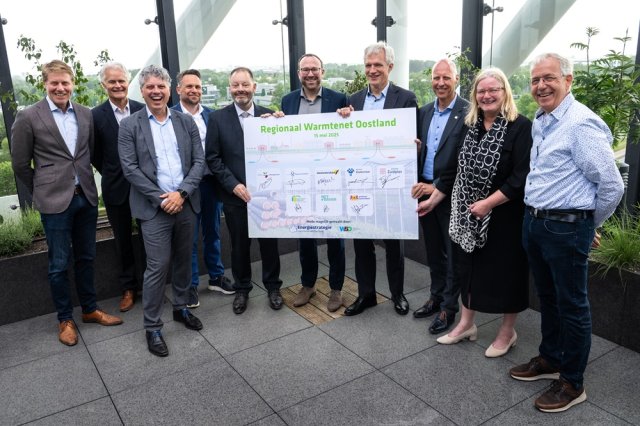Research into an Eastland Regional Heat Grid set out in letter of intent
On Thursday, May 15, Alderman Bouke Velzen (sustainability) and the municipalities of Lansingerland, Pijnacker-Nootdorp, Waddinxveen, Zuidplas, the province of South Holland, greenhouse horticulture companies and NetVerder (regional grid operator Stedin) signed a letter of intent for a Regional Eastland Heat Grid to be further explored.
One of the reasons NetVerder is doing this is to avoid overloading the power grid (grid congestion). The province and others are trying to make sure that heat networks get priority in making connections, because there is currently not enough room on the power grid for everyone at once.
A new heat network in the Oostland region will provide thousands of homes and, in particular, hundreds of greenhouses with sustainable heat. This is good for the climate and for the future of our region. By signing the agreement of intent, the municipality is taking the next step towards a sustainable regional heat supply.
Conduct feasibility study
The board of mayor and aldermen of Zoetermeer has decided to sign the letter of intent to investigate the feasibility of developing a regional heat grid. Zoetermeer will remain administratively and officially involved in the development of the heat grid because the heat grid offers opportunities for Zoetermeer.
The regional heat network is not on land owned by the municipality of Zoetermeer. Therefore, the agreements in the letter of intent regarding the provision of land and cooperation in spatial plans do not apply to Zoetermeer. If a branch from the regional heat grid to Zoetermeer is desirable, the municipality will make agreements about this in a separate agreement with NetVerder or the developer of a geothermal source. This is a renewable heat source because the underground heat is constantly being replenished.
Alderman Bouke Velzen (sustainability): "The signing of the letter of intent is another step in the right direction towards a natural gas-free environment. This heat network is of great importance for our region with its greenhouse horticulture and also offers opportunities to provide affordable, reliable and sustainable heat in collective buildings in the Meerzicht district in particular."
Working together towards a natural gas-free Zoetermeer
Zoetermeer wants to stop using natural gas completely by 2040. The Heat Vision states how we will switch to sustainable ways of heating. This heat vision will be reviewed in the next 2 years.
In neighborhoods with many high-rise buildings, shared heat networks are a good option. It is one of the possible alternatives for the Meerzicht neighborhood. Other alternatives for the high-rise buildings in Meerzicht include a system with soil energy heat cold storage (WKO). The choice of natural gas alternative is up to the building owners themselves. A large sustainability subsidy was recently made possible for the various owners' associations in Meerzicht. By making use of this and insulating the high-rise buildings, there is a choice for the building owners a high or medium-temperature source (from the regional heat grid) or a low-temperature source (such as WKO). In 2024, the Zoetermeer City Council approved a plan on how the municipality will enter into discussions about this with owners of existing high-rise buildings. In 2025, the municipality will start discussions about heat (the 'heat dialogue') with residents of high-rise buildings in parts of the Inner City and in Meerzicht.
Heat grid an important alternative to natural gas
The heat grid will supply sustainable heat to about 250 greenhouse farms (1,500 hectares) and about 45,000 homes in the region. The heat grid is an important alternative to natural gas and ensures that the full power grid is not further burdened.
Continuing exploratory collaboration
This new step is a continuation of the existing cooperation within the Warmte Samenwerking Oostland (WSO), in which the municipalities and greenhouse horticulture have been working together for some time to make greenhouse horticulture and the built environment more sustainable.
Next steps and planning
In the coming months, the parties involved will work on further elaborating both the cooperation and the feasibility of the regional heat grid. In September, an information evening will be organized for the city council members of all 5 municipalities involved. There the municipal council members from the region will be updated on the progress, opportunities and next steps in the development of the heat grid.

